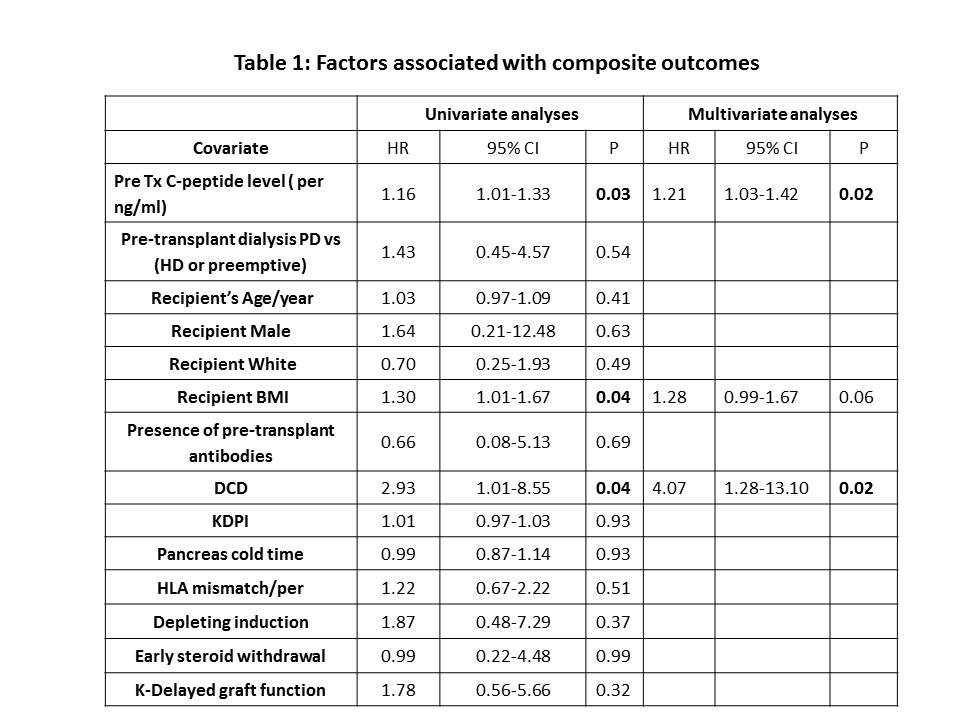High-Level Pre-Transplant C-Peptide Among T2d Recipients of Simultaneous Pancreas and Kidney Transplants is Associated with Reduced Pancreatic Graft Function
University of Wisconsin, Madison, WI
Meeting: 2022 American Transplant Congress
Abstract number: 1167
Keywords: Donation, Outcome, Pancreas transplantation
Topic: Clinical Science » Pancreas » 65 - Pancreas and Islet: All Topics
Session Information
Session Name: Pancreas and Islet: All Topics
Session Type: Poster Abstract
Date: Sunday, June 5, 2022
Session Time: 7:00pm-8:00pm
 Presentation Time: 7:00pm-8:00pm
Presentation Time: 7:00pm-8:00pm
Location: Hynes Halls C & D
*Purpose: Among selected patients with end-stage renal disease (ESRD) and type 2 diabetes (T2DM), simultaneous pancreas and kidney (SPK) transplants can be an effective option, with the advantage of improved life expectancy and better quality of life. However, data are limited about outcomes in T2DM SPK recipients based on the pre-transplant C-peptide levels.
*Methods: In this study, we reviewed all T2DM SPK recipients transplanted at our center between 2012 and 2020, and categorized them based on the pre-transplant C-peptide levels into three groups, as low (≤2 ng/ml); medium (>2-8 ng/ml) and high (>8 ng/ml). A composite outcome of graft failure (uncensored or death censored, DCGF) and graft dysfunction (use of any antidiabetic agents including insulin, injectable or oral agents) was the outcome of interest.
*Results: There were a total of 76 SPK recipients (low, n=14; medium, n=47; high, n=15). Most baseline characteristics were similar between the groups. The mean post-transplant follow-up was 44.1 months in low, 42.8 in medium, and 31.9 months in the high groups (p=0.36). At last follow up, there were no composite outcomes in the low group; in contrast, 3 (including 1 DCGF) had graft failure, and an additional 7 were on an antidiabetic agent in the medium group (21%), and 2 ( including 1 DCGF) had graft failure and an additional 3 were on an antidiabetic agent in the high group (33%). In univariate analysis, each pre-transplant C-peptide unit was associated with an increased risk of the composite outcome of graft failure or graft dysfunction (HR: 1.16; 95% CI: 1.01-1.33; p=0.03). After adjustment for other significant variables, higher pre-transplant C-peptide was still associated with increased risk of the composite outcome (HR: 1.21; 95% CI 1.03-1.42; p=0.02). The only other variable associated with increased risk for the composite outcome was DCD donor (HR: 4.07; 95% CI: 1.28-13.10; p=0.02). (Table 1)
*Conclusions: Although limited by the small sample size, in this cohort, we found excellent outcomes among T2DM SPK recipients overall. However, a higher level of pre-transplant C-peptide was associated with a worse post-transplant composite graft failure and graft dysfunction outcome, particularly in cases of DCD donors.
To cite this abstract in AMA style:
Parajuli S, Mandelbrot D, Aufhauser D, Kaufman D, Odorico J. High-Level Pre-Transplant C-Peptide Among T2d Recipients of Simultaneous Pancreas and Kidney Transplants is Associated with Reduced Pancreatic Graft Function [abstract]. Am J Transplant. 2022; 22 (suppl 3). https://atcmeetingabstracts.com/abstract/high-level-pre-transplant-c-peptide-among-t2d-recipients-of-simultaneous-pancreas-and-kidney-transplants-is-associated-with-reduced-pancreatic-graft-function/. Accessed February 21, 2026.« Back to 2022 American Transplant Congress

